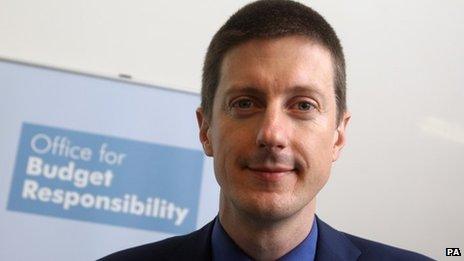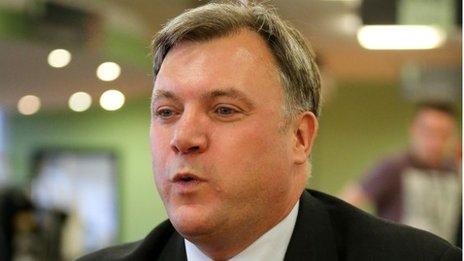Watchdog doubts ability to audit Labour policies for 2015 poll
- Published

Mr Chote said the OBR needed sufficient resources to do the job
The Office for Budget Responsibility has said "significant issues" must be settled if it is to audit the manifesto promises of opposition parties.
The watchdog scrutinises government tax and spending pledges and Labour wants it to do the same for its economic programme before the 2015 election.
OBR boss Robert Chote said this could benefit policy making but said it might be better to wait until the 2020 poll.
Rushing the process could be "damaging" for the independent body, he told MPs.
Under Labour's plans, the OBR would be able to study parties' manifesto pledges to see if they add up without passing judgement on individual policies.
This would ensure a "more informed debate" at the election without undermining the watchdog's impartiality, Labour's shadow chancellor Ed Balls has said.
Chancellor George Osborne is opposed to the idea, insisting the OBR was set up in 2010 specifically to provide growth and borrowing forecasts and assess the impact of government policies on its own fiscal targets.
The Lib Dems have said the idea of letting the OBR do the same for opposition parties has merit but is unlikely to be viable in time for next year's general election.
Mr Chote has already warned that the law would need to be amended to change the OBR's remit.
'Rules of the game'
In written evidence submitted to the Treasury committee of MPs, he said independent scrutiny of pre-election policy proposals may contribute to "better policy making" and could help "facilitate" the formation of coalitions in the event of inconclusive poll results.
But he said it would have major repercussions for political parties and civil servants as well as the watchdog itself.
"First and foremost, it would be essential to establish clear 'rules of the game' for all involved, well before the election, and to ensure that adequate resources were in place to do the job properly," he told the Treasury Select Committee.
"To embark on this exercise in a rush, or with insufficient resources, could be very disruptive for the parties and very damaging to the OBR.
"Putting it bluntly, if Parliament wished us to play this role in the 2015 election, we would need a clear steer in the very near future to have any hope of putting the necessary practical arrangements in place in time to deliver a smooth process."
'Still time'
He went on to suggest the idea may need to be put on the backburner until after the general election.
"Indeed advocates of the reform may now feel that it would be better to consider these issues at the beginning of the next parliament - with a view to being fully prepared before the subsequent election - rather than rush into it for 2015 and risk undermining support for the idea in the longer term."
The cross-party committee has said the OBR should have "absolute discretion" over the work it undertakes, including the scope to examine "the fiscal policies of political parties".
In response, Labour said there was growing cross-party support behind the idea.
"If the political will is there by the early summer then, as Robert Chote says, it is still possible to make this reform happen before next year's election," Mr Balls said.
- Published14 October 2013

- Published9 September 2010